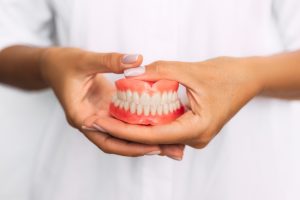

Common Misconceptions About False Teeth
In 2023, advancements in dental technology have allowed for the evolution of false teeth or dentures, debunking common myths from the past. Many misconceptions about dentures, including poor fit and noticeably artificial appearance, still linger in people’s minds, causing unnecessary fears and doubts.
Our dentists in Staten Island tackle old myths about dentures, ensuring you have the right information to make the best decision for your oral health. If you’re contemplating getting dentures or simply want to understand them better, stay with us as we shine a light on some of the most popular myths and unveil the reality of modern denture technology.
Debunked Denture Myths
Dentures have long been a popular solution for those with missing teeth, but unfortunately, myths and misconceptions about dentures persist.
- One of the most prevalent myths is that dentures mean you can stop worrying about dental hygiene. This couldn’t be further from the truth. Denture wearers should still practice good oral hygiene by removing dentures daily, soaking and cleaning them overnight, and gently wiping their gums to remove bacteria. Maintaining proper oral hygiene is essential for preventing infections and maintaining overall oral health.
- Another myth surrounding dentures is that they last forever. While it would be convenient if this were true, dentures generally last 5 to 7 years but may need evaluation for wear and fit annually. Over time, they can fracture, deteriorate, or loosen due to natural wear and changes in the jawbone. It’s important to consult with a dentist regularly to ensure your dentures are functioning optimally.
- Some individuals worry that getting dentures will change the appearance of their smile. However, modern dentures are carefully matched to remaining teeth to look natural. Missing teeth can make facial sagging more apparent, and dentures can reduce this sagging by providing support to the facial structure.
- There’s a misconception that only elderly people wear dentures. While many elderly individuals do wear dentures, some young people benefit from this dental solution. Statistics show that age groups from 18 to 74 wear complete or partial dentures, with a higher prevalence among women. Dentures can provide a valuable option for anyone dealing with tooth loss at any stage of life.
Dentures as a Cosmetic-Only Solution
Many people have the misconception that dentures are purely a cosmetic solution for missing teeth. They believe that dentures only serve to improve the appearance of one’s smile, without any functional benefits. However, this is far from the truth. While dentures undoubtedly enhance the aesthetics of a person’s smile, they also play a vital role in restoring proper oral function and overall well-being.
Dentures provide several essential functional benefits beyond just cosmetic improvements. They enable individuals to chew and eat food properly, ensuring proper digestion and nutrition intake. Additionally, dentures can help improve speech clarity by filling gaps caused by missing teeth, preventing speech impediments and self-consciousness. They also aid in maintaining the structural integrity of the mouth and facial muscles by providing support to the surrounding tissues, preventing sagging and premature aging.
Truths About Denture Durability
Another common myth surrounding dentures is that they’re fragile and prone to damage. However, it’s essential to understand the truths about denture durability before dismissing them as fragile or unreliable.
Denture bases are typically made from an acrylic material that’s sturdy enough to withstand normal wear and tear associated with daily use. Denture teeth are often made from high-quality resin or porcelain, which can be quite durable if properly cared for. Additionally, advancements in dental technology have led to stronger bonding agents and superior techniques for denture fabrication, further enhancing their durability.
However, dentures do have a lifespan. Over time, they may experience natural wear and tear, which can affect their fit and functionality. Factors such as oral hygiene practices, diet, and overall oral health can also impact the longevity of dentures. It’s recommended to have regular dental check-ups to assess the condition of your dentures and ensure they are functioning optimally.
It’s crucial to maintain good oral hygiene even with dentures. Regular cleaning of dentures using recommended techniques and solutions can help prolong their durability and prevent issues like odor or staining.
Maintenance and Lifespan
While dentures can provide a functional smile for several years, it’s important to evaluate their wear and fit annually. On average, dentures typically last around 5 to 7 years before they may need replacement or adjustment.
Proper maintenance can significantly impact the lifespan of dentures. Just like natural teeth, they require regular care and attention to keep them in optimal condition. Some individuals mistakenly believe that once they have dentures, oral hygiene becomes less important. However, this couldn’t be further from the truth.
Denture Care and Oral Hygiene
Taking proper care of your dentures goes beyond just cleaning them; it also involves maintaining good oral hygiene. By following these recommendations, you can ensure the longevity and effectiveness of your false teeth:
- Cleaning Routine: Remove your dentures every day and clean them thoroughly using a denture brush or a soft-bristled toothbrush. Avoid using abrasive materials that could damage the surface of your dentures. Use mild soap or denture-specific cleansers to clean them, and don’t forget to rinse them well before wearing them again.
- Soaking Overnight: Soak your dentures overnight in a denture cleaning solution or water. This helps to loosen any debris or stains and keeps your dentures fresh and clean.
- Regular Dental Check-ups: Schedule regular dental appointments with your dentist to have your dentures examined. Over time, dentures may require adjustments or relining to ensure a proper fit and prevent discomfort or gum irritation.
- Oral Hygiene for Natural Gums: Even if you have complete dentures, it’s essential to maintain good oral hygiene for your remaining gums. Gently brush your gums, tongue, and palate with a soft-bristled toothbrush daily to remove bacteria and stimulate blood circulation.
Dental Alternatives: Comparing Dentures to Implants
When it comes to replacing missing teeth, two popular options are dentures and dental implants. Each option has its advantages and considerations.
Dentures have been a popular choice for replacing missing teeth for many years. They offer a more affordable solution compared to dental implants. However, it’s important to note that dentures do come with some disadvantages. They may not provide the same level of stability as implants, which can affect speech and eating efficiency. Additionally, dentures may require periodic relining or adjustments due to changes in the jawbone’s shape over time.
Contact Our Staten Island Dentists Today
Are you ready to find a replacement for lost teeth? Contact our Staten Island dentists today to schedule an appointment. We’ll evaluate your oral health and go over your options. Call us today at (718) 948-5111.



